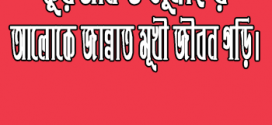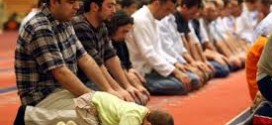Allah says, I created man and jinn for no other purpose than to worship Me only. (Dhariyat 51:56)
“…and the remembrance of Allah is greater.”
(Taha: 14) (Al Ankabut:45)“And he who rejects my remembrance then he will have a constricted life, and we will resurrect him on the day of Judgment blind”
(Ta Ha: 124).
Allah says to the Believers:
“O you who believe! remember Allah, remembering Him much and glorify Him morning and evening.” (33:41,42)
“O you who believe! When you rise up for salah, wash you faces, and your hands up to the elbows, and lightly rub your heads and (wash) your feet up to the ankles. And if you are unclean, purify yourselves … Allah would not place a burden on you, but He would purify you and would perfect His grace upon you, that you may give thanks.” [5:6]
… surely prayer is a timed ordinance for the believers.
(Qur’an An-nisa:103)
[as-Sajdah; 16]
(98:5)
(Qur’an S 49:13)
(53:32)“The Believers must (eventually) prosper: Those who humble themselves in their Prayers, who avoid vain talk, who are active in deeds of Charity, and who abstain from (illegal) sex.”
(Al-Mu’minun 23: 1-5)
==========================
A learn scholar; Kabir Edmund Helminski, in Living Presence wrote about The Physical & Mental Benefits of the Islamic Prayer (Salaat):-
“The Islamic ritual prayer, practiced five times a day, is a sequence of standing, bowing, prostrating, and kneeling, accompanied by prescribed verbal affirmations and lines from the Qur’an selected and recited by the individual. The prayer is understood to be invalid without a mindful witnessing of the presence of God. Physically, it exercises the major joints (especially the spinal column), massages the intestinal tract, transmits a reflex to the liver, regulates the breath, and stimulates the frontal cortex of the brain as it is brought to the ground, while momentarily leaving the heart in a higher position than the brain. Salaat is a form that integrates mindfulness, mental precision, affirmation, devotion, and stretching. Done five times a day for a lifetime, it has profound effects on the body and soul.”
Niyyat – when one begins by saying “Allahu akbar”
“Body feels relieved of weight owing to even distribution on both feet. Straightening back improves posture. Mind is brought under control of intellect. Vision is sharpened by focusing upon floor, where head will prostrate. Muscles of upper and lower back are loosened. Higher and lower centers of brain are united to form singleness of purpose.”
Qiyām – during which one recites Al-Fatiha and additional surahs of the Qur’an
“Extends concentration, causes further relaxation of legs and back, generates feelings of humility, modesty, and piety. In the recital of the above verses, virtually all of the sounds that occur in Arabic are uttered, stimulating dispersal of all of the ninety-nine divine attributes in perfectly controlled degrees throughout the body, mind, and soul. The sound vibrations of the long vowels ā, ī, and ū stimulate the heart, thyroid, pineal gland, pituitary, adrenal glands, and lungs, purifying and uplifting them all.”
Rukū – bending at the waist
“Fully stretches the muscles of the lower back, thighs, and calves. Blood is pumped into upper torso. Tones muscles of stomach, abdomen, and kidneys. Over time, this posture improves the personality, generating sweet kindness and inner harmony.”
Qauma – rising from rukū
“The fresh blood moved up into torso in previous posture returns to its original state, carrying away toxins. Body regains relaxation and releases tension.”
Sajdah – prostration
“Knees forming a right angle allow stomach muscles to develop and prevents growth of flabbiness in midsection. Increases flow of blood into upper regions of body, especially the head (including eyes, ears, and nose) and lungs; allows mental toxins to be cleansed by blood. Maintains proper position of fetus in pregnant women. Reduces high blood pressure. Increases elasticity of joints. Annihilates egotism and vanity. Increases patience and reliance upon God. Increases spiritual stations and produces high psychic energy throughout body. This posture of supreme submission and humility is the essence of worship.”
Sajda is performed using seven parts of the body. If you miss one part, the prayer will become invalid.
1. Forehead
2. & 3. both palms
4. & 5. both knees
6. & 7. the big toe of both of your feet
Quūd – assuming the sitting position after sajdah
“For men, the heel of the right foot is curled up and the weight of the leg and part of the body rests upon it. This aids detoxification of the liver and stimulates peristaltic action of the large intestine. Women keep both feet, soles up, underneath their bodies. The body returns to even greater relaxation, and the posture assists digestion by forcing the contents of the stomach downward.”
Repeat of Sajdah
“Repetition of the deep prostration within a few seconds cleanses the respiratory, circulatory, and nervous systems. Gives experience of lightness of body and emotional happiness. Oxygenation of entire body is accomplished. Balances sympathetic and parasympathetic nervous systems.”
 কিতাবুল ইলম কুরআন ও সুন্নাহ'র আলোকে জান্নাত মূখী জীবন গড়ি।
কিতাবুল ইলম কুরআন ও সুন্নাহ'র আলোকে জান্নাত মূখী জীবন গড়ি।




